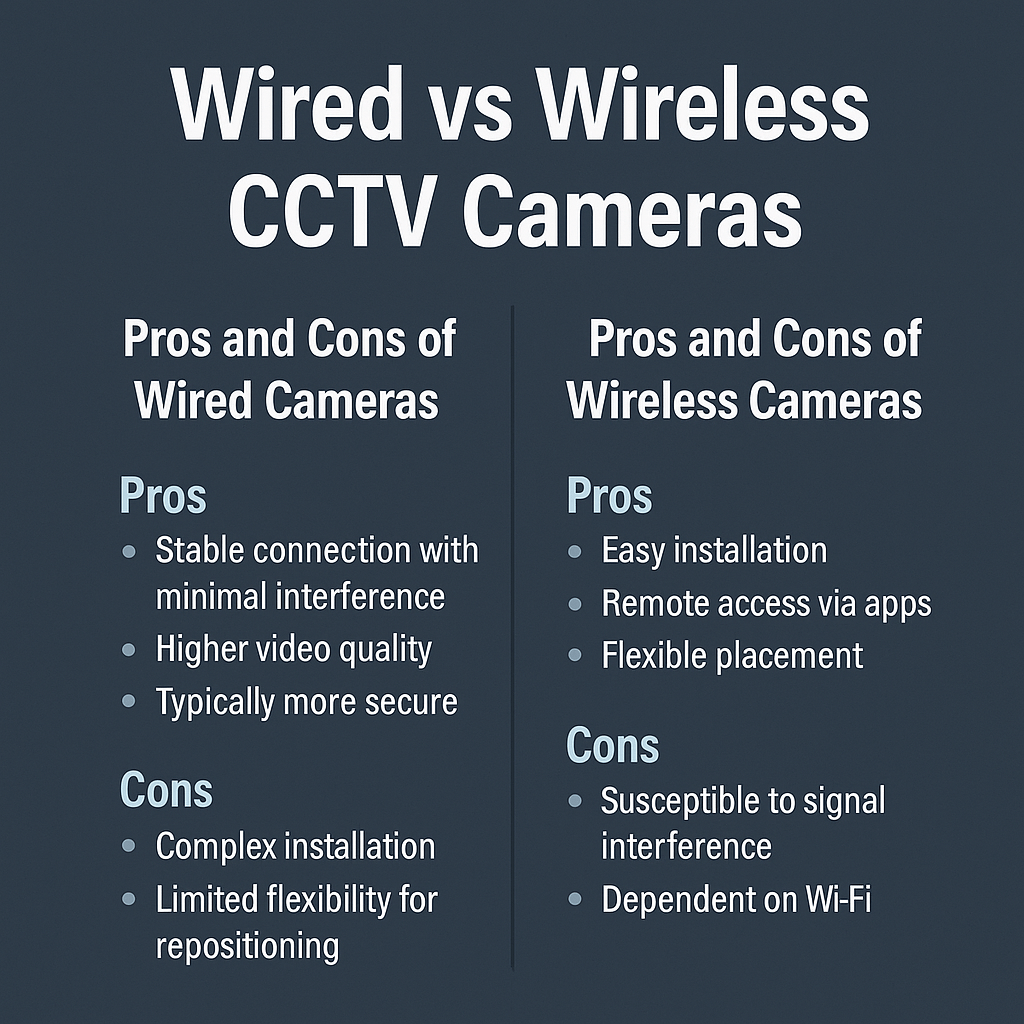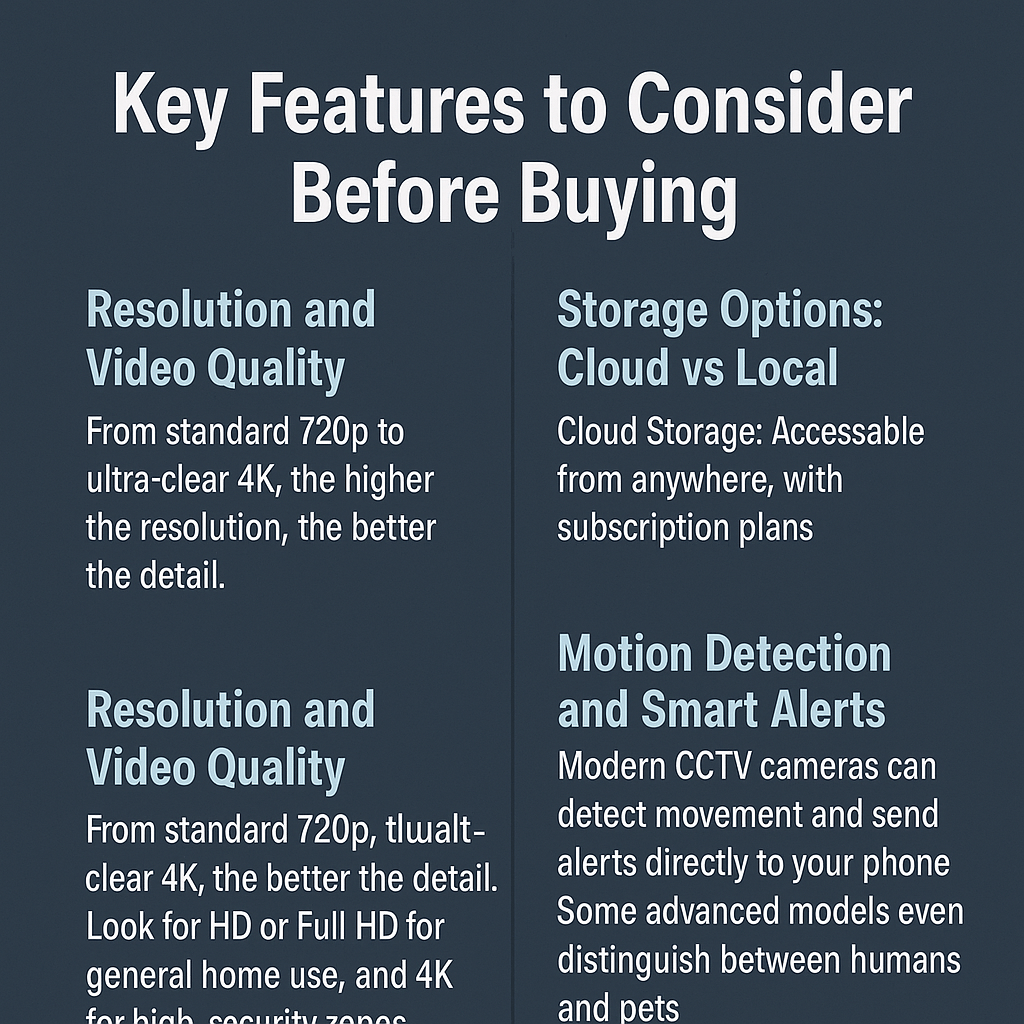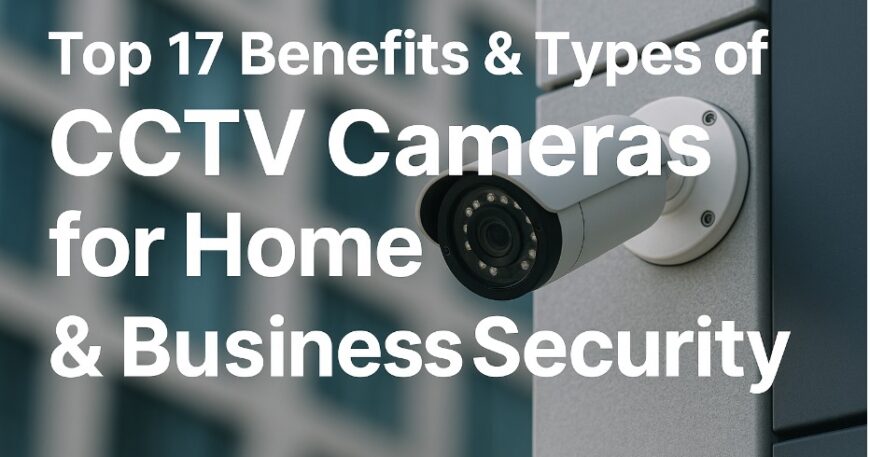Top 17 Benefits & Types of CCTV Cameras for Home & Business Security
In today’s rapidly evolving world, security is no longer a luxury—it’s a necessity. CCTV cameras have become essential tools for protecting our homes, businesses, and public spaces. Whether you’re guarding your family, monitoring office premises, or enhancing public safety, a well-placed CCTV system can make all the difference.
From sleek indoor dome cameras to weatherproof outdoor units, there’s a CCTV solution for every need and budget. In this blog, we’ll explore the many advantages of CCTV, the types available, and how to choose the right one for your situation.
Let’s begin with the basics.
What Are CCTV Cameras?
Brief History and Evolution
CCTV (Closed-Circuit Television) technology dates back to the 1940s. Initially used for military monitoring in Germany, the system was later adopted for traffic control and bank surveillance. Over the decades, technology has transformed CCTV from grainy, wired setups to high-definition, wireless smart systems that integrate seamlessly with smartphones.
Key Components of a CCTV System
A modern CCTV setup generally includes:
-
Cameras – Dome, bullet, PTZ, or others
-
DVR/NVR – Digital or network video recorder
-
Cables or Wireless Routers – For connectivity
-
Monitor – To view live or recorded footage
-
Power Supply – Batteries or direct wiring
Together, these elements ensure a smooth and effective surveillance experience.
Why CCTV Cameras Are Essential in 2025
Crime Prevention and Deterrence
Visible CCTV cameras significantly reduce theft, burglary, and vandalism. Criminals are less likely to target a property that’s under 24/7 watch.
Enhanced Surveillance for Businesses
Retail stores, warehouses, and office spaces benefit from CCTV as it helps reduce internal theft, increase employee accountability, and enhance customer safety.
Improved Home Safety and Monitoring
With remote access through mobile apps, homeowners can monitor their premises in real-time, even while vacationing abroad. It’s a peace-of-mind solution for working parents and elderly caregivers.
Different Types of CCTV Cameras
Dome Cameras
Named for their dome-like shape, these are popular for indoor use due to their sleek design and 360-degree coverage.
Ideal Use Cases
-
Retail stores
-
Home interiors
-
Hotels
Bullet Cameras
These long, cylindrical cameras are ideal for outdoor monitoring.
Outdoor Surveillance Strengths
-
Night vision
-
Weather resistance
-
Long-range capture
PTZ Cameras (Pan-Tilt-Zoom)
These allow operators to pan, tilt, and zoom manually or automatically.
Advanced Functionality and Control
-
Ideal for large properties
-
Suitable for live tracking
C-Mount and Day/Night Cameras
C-Mount cameras have detachable lenses for different distances, while Day/Night cameras can function in varying light conditions.
Low-Light and Flexible Lens Options
-
Parking lots
-
Industrial zones
-
Warehouses
Wired vs Wireless CCTV Cameras
Pros and Cons of Wired Cameras
Pros:
-
Stable connection with minimal interference
-
Higher video quality
-
Typically, more secure
Cons:
-
Complex installation
-
Limited flexibility for repositioning
Wired systems are ideal for larger properties where a constant connection is crucial, such as office buildings and factories.
Pros and Cons of Wireless Cameras
Pros:
-
Easy installation
-
Remote access via apps
-
Flexible placement
Cons:
-
Susceptible to signal interference
-
Dependent on Wi-Fi
Wireless cameras are perfect for homes, small offices, or temporary surveillance setups.

Key Features to Consider Before Buying
Resolution and Video Quality
From standard 720p to ultra-clear 4K, the higher the resolution, the better the detail. Look for HD or Full HD for general home use, and 4K for high-security zones.
Storage Options: Cloud vs Local
-
Cloud Storage: Accessible from anywhere, with subscription plans.
-
Local Storage: DVR or SD card-based, with no recurring fees.
Motion Detection and Smart Alerts
Modern CCTV cameras can detect movement and send alerts directly to your phone. Some advanced models even distinguish between humans and pets.

Top Brands in CCTV Technology
Hikvision
A global leader known for high-quality, enterprise-grade cameras. Offers facial recognition and AI analytics.
Dahua
Popular in both commercial and residential sectors, Dahua combines affordability with powerful features.
Arlo
Famous for its wireless, battery-powered cameras with rich app integration and cloud services.
Nest
Google’s Nest cameras offer seamless integration with other smart home devices and come with impressive video quality and cloud backup.
Installation Tips and Best Practices
Indoor vs Outdoor Setup
Outdoor cameras must be weatherproof and have night vision. Indoor cameras focus more on design and blend with décor.
Power Supply and Connectivity
Decide between:
-
Wired power (more stable)
-
Battery-operated (more flexible)
Professional vs DIY Installation
While many opt for DIY to save money, professional installation ensures proper placement and maximum coverage, especially for large or multi-story properties.
Legal and Ethical Considerations
Privacy Laws by Region
Different countries and states have regulations around recording individuals. For example, in the UK and EU, GDPR requires clear signage and justifiable reasons for surveillance.
Ethical Usage Guidelines
-
Do not install in private areas like bathrooms.
-
Inform guests or employees they are being recorded.
-
Use for safety, not to violate privacy.
Cost of CCTV Cameras and Systems
Budget Options
-
Range: $50–$200
-
Ideal for small homes and basic monitoring
Mid-Range Systems
-
Range: $150–$500
-
Includes DVR/NVR systems, night vision, and app access
Premium Surveillance Solutions
-
$800 and above
-
Offer AI, cloud analytics, multiple camera systems, and remote controls
Maintenance and Troubleshooting
Common Issues and Fixes
-
Blurry footage: Clean the lens or check resolution settings
-
Connection problems: Restart router or check cables
-
False alarms: Adjust motion sensitivity
How to Clean and Protect Cameras
-
Use soft cloths and lens-friendly cleaning solutions
-
Install protective hoods for outdoor cameras
-
Regularly check for water damage or wiring wear
Integration with Smart Home Systems
Using CCTV with Alexa, Google Home
Many cameras now respond to voice commands, letting you view live footage on smart displays.
App-Based Monitoring
-
Check feeds remotely
-
Receive alerts
-
Speak through built-in microphones
Great for parents checking in on kids or store owners managing from afar.
The Future of CCTV Cameras
AI and Facial Recognition Integration
AI is revolutionizing CCTV by enabling automatic facial recognition, crowd counting, and anomaly detection.
Cloud Video Analytics
Advanced systems now analyze video in real time, flagging unusual behavior or security breaches instantly.
Frequently Asked Questions
1. How many CCTV cameras do I need for a 3-bedroom house?
Typically, 4 to 6 cameras cover entrances, the backyard, hallway, and living areas.
2. Can CCTV cameras work without internet?
Yes. Cameras connected to a DVR/NVR system can record footage locally without internet, though remote viewing won’t be available.
3. Are wireless cameras better than wired ones?
Each has pros and cons. Wireless is easier to install, while wired is more reliable for larger areas.
4. How long does CCTV footage last?
Depending on storage capacity, most systems retain footage from 7 to 30 days.
5. Are CCTV cameras legal in apartments or condos?
Yes, but you must follow building rules and privacy laws—especially regarding shared spaces.
6. What’s the best camera for night vision?
Look for infrared (IR) cameras or those with starlight night vision for clearer nighttime footage.
Conclusion: Is Investing in CCTV Cameras Worth It?
Absolutely. CCTV cameras are a cost-effective way to deter crime, monitor loved ones, and safeguard your business assets. With advancements like smart integration, AI analytics, and cloud storage, modern CCTV systems are more efficient and accessible than ever.
Whether you’re a homeowner, a shopkeeper, or a tech-savvy renter, there’s a camera out there to meet your security needs. Start small, scale as needed and enjoy the peace of mind that comes from knowing your world is watched over.




